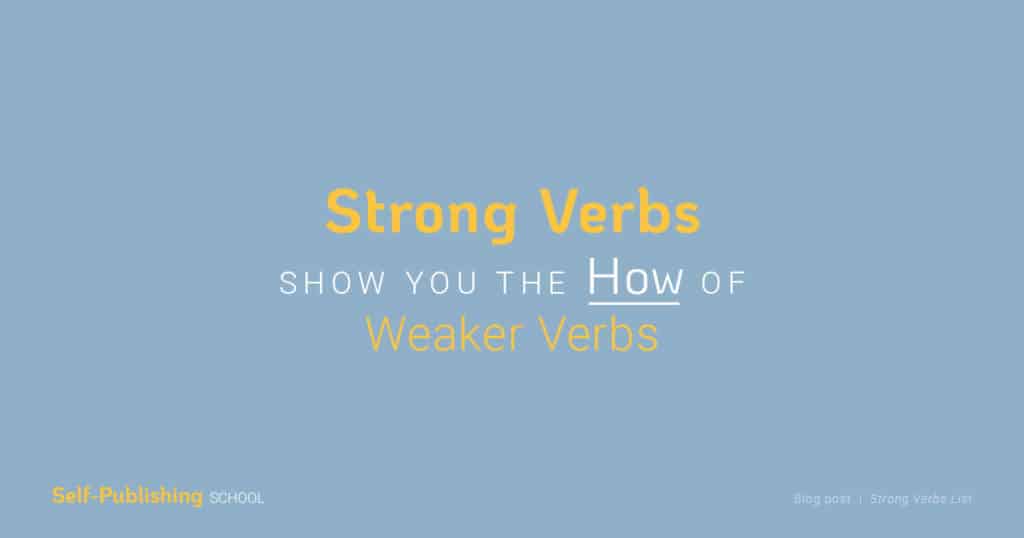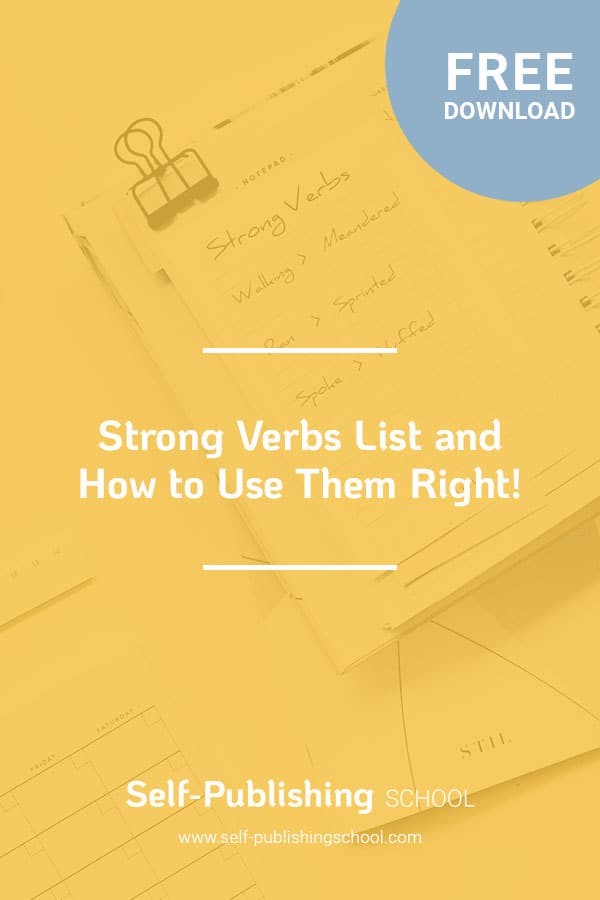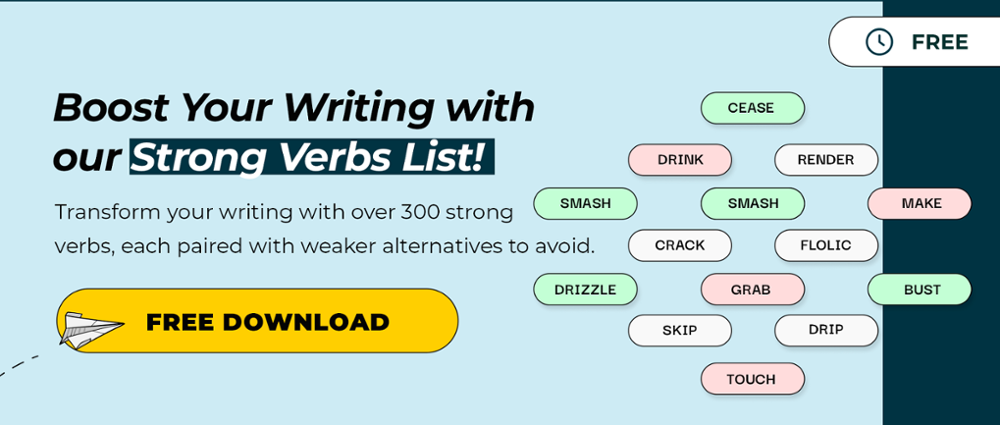There’s a lot of advice online about how strong verbs can improve your writing. And it’s true! But like with any “writing rule,” it’s important to understand what they are so you can choose to use them or not.
When writing, or editing your writing, you’re often trying to create a certain feeling in the reader. That feeling is crafted by the word choice you use, the character interactions, and overall makeup of the scene. But even small changes in how you describe a situation can change how it comes across to the reader.
In essence, strong verbs allow you to increase the specificity of the feeling you’re aiming for.
But of course, there is a limit to how this works and when it can be too much in a single draft. We’ll cover all of this in this article, along with the overall uses, examples, and a list of strong verbs.
Here’s how to use strong verbs:
- What is a strong verb?
- How to Tell if You Need Strong Verbs
- Strong verbs VS weak
- Weak verbs to replace in writing
- What are “to be” verbs?
- To be verbs list
- How to use strong verbs the right way
- Why you should use strong verbs
- List of Strong Verbs
I never struggled with putting my thoughts on paper or even coming up with the story ideas in the first place. In fact, outlining a book is one of my favorite things to do!
Nope. My biggest hurdle was bringing the emotion I was trying to convey to life.
And as I delved deeper into the literary world, I quickly realized that using strong verbs is a must if you want to create something that leaves a lasting impact.
If you’re looking for a quick solution—something you can take right now and go back and edit your last chapter with—this strong verbs list has over 300 of them and include which verbs you can search for to replace.
Here’s a downloadable list of strong verbs for you to use:
What are strong verbs?
A strong verb is a better and more descriptive version of a word that depicts the way the verb is performed, making it specific and sharper for the scene you’re writing.
Thanks to every English class growing up, you know a verb is a word used to describe an action, state, or occurrence. A strong verb is just a more specific version of the same verb.
Take “walk” for example. There are hundreds of ways in which someone can walk. That’s why the word “walk” is considered a weak verb and it’s often recommended to find a strong verb to replace it with. Below are some samples of weak verbs with the strong verbs you can use to replace them:
| Weak Verb | Strong Verb Variations |
|---|---|
| Run | Bolt, sprint, jog |
| Walk | Slink, trot, mope |
| Make | Create, forge, foster, brew |
| Say | Speak, voice, purr, mutter |
So although you can use the basic verb and still tell the same story, you will create a deeper impact within the reader if you use a strong verb in its place.
Examples: How to Tell if You Need to Use More Strong Verbs
There’s a “rule” in writing that’s an easy way to determine how many weak verbs you’re using, and you can do a quick search of your document to find them. The “rule” is one you may have heard before: don’t use adverbs.
An adverb is a word that modifies the word before it. When used after a verb, it can actually make the verb used appear weaker and less specific in your writing.
Many writers will initially use an adverb and later edit to make the sentence more specific as the imagery sharpens inside their own mind.
Disclaimer: adverbs are not bad! Many people in the writing community will say they’re awful and you should replace all of them with strong verbs. This isn’t always the case. As with any rule in writing, moderation and balance are key.
Robin Hobb, a very successful fantasy author with many different book series, uses adverbs in very large amounts. So find areas where being more concrete and specific will make the writing better, and leave some adverbs alone.
That said, if you find that you’re using too many words that end in “-ly”, you can edit many of them into more concrete verbs.
Here’s an example of what this looks like when editing writing:
Weak verb / adverb: Susan walked slowly to her next class.
Strong verb to replace: Susan moped to her next class.
Weak verb / adverb: The bird flew quickly from treetop to treetop.
Strong verb to replace: The bird darted from treetop to treetop.
Weak verb / adverb: “What’s wrong with you?” she said sharply.
Strong verb to replace: “What’s wrong with you?” she spat.
Weak verb / adverb: Tommy gingerly took a bite of the apple, chewing with disgust before swallowing loudly.
Strong verb to replace: Tommy gingerly took a bite of the apple, chewing with disgust before gulping it down.
These examples all include a verb with an adverb next to it. In all cases, you can replace that combination with a more specific strong verb that makes the writing more concrete and the visual sharper. As you can see in the last example, there is an adverb in the sentence that was left there, and another that was replaced for something that worked better.
Strong Verbs vs. Weak Verbs
What’s the real difference here? How can you tell the difference between a strong verbs and weak verbs?
Since you can’t exactly ask words to flex, you need another system to determine if your verbs are weak or not.
Here’s how we define strong verbs vs weak verbs:
Weak verbs are the “basic” forms of a specific action, like “walked” or “ran.”
Strong verbs are the way the verb is performed, like “stomped” or “bolted.”
So the main thing you need to remember when it comes to strong verbs vs weak verbs is if the action is being performed a certain way, using a strong verb is the way to go.
If someone is just walking without any other action to it, then using “walk” is perfectly acceptable.
Weak Verbs to Replace to Make Your Writing Stronger
The weakest verbs you can replace in your writing are “to be” verbs. These pull your writing quality down and peg you as an amateur.
Other weak verbs include basic forms of any verb, like run, walk, say, sit.
Now, keep in mind that weak verbs are absolutely okay to use on occasion.
The issues arise when you’re using these verbs over and over again when there are better, stronger verbs you can use to make your writing more powerful.
Sometimes the best verb to use in a situation is the weak verb. Just keep a look out for how often you’re using that basic form so you can beef up your writing by replacing them in other places.
What are “to be” verbs & how to replace them in your writing?
To be verbs are any verbs used to describe a state of being, including these terms: is, am, are, was were, be, being, been.
In order to make your writer stronger, it’s important when to use them and when they’re making your writing clunky and weak.
Here are a few examples of how to replace to be verbs with something stronger:
| "To Be" Verbs Sentence | Replacing "To Be" Verbs | Replacing Weak Verb with Strong Verb |
|---|---|---|
| She was walking through the corridor. | She walked through the corridor. | She slinked through the corridor. |
| Conrad is afraid of the dark. | Conrad fears the dark. | Conrad cowers from the darkness. |
| I was being chased by someone I didn't know. | I was chased by someone I didn't know. | Someone I didn't know chased after me. |
| I was wanting to visit this forest for as long as I can remember. | I wanted to visit this forest for as long as I can remember. | I longed to visit this forest for as long as I can remember. |
“To Be” Verbs List
One of the best ways you can strengthen your writing is to use strong to be verbs. These will instantly make your writing more compelling and less amateurish.
These are state-of-being verbs like “to be” verbs to look out for in your writing:
- Am
- Are
- Be
- Been
- Being
- Can
- Could
- Did
- Do
- Does
- Had
- Has
- Have
- Is
- May
- Might
- Must
- Shall
- Should
- Was
- Were
- Will
- Would
How to Use Strong Verbs in Writing
Littering your writing with strong verbs won’t necessarily make it any better. In fact, if you overdo it, those verbs will have the opposite effect.
Instead of making your writing stronger, it can bring it down to an amateur level.
That being said, I created the video below in order to help you understand how to use strong verbs in your writing the right way.
Because your writing will be better overall. One of the best ways you can immediately make our writing stronger is by going through and crossing out each weak verb and replacing it with a better one.
Here’s how your writing will improve when you choose to use strong verbs.
1. Stronger visuals
One of the most important parts of any book is that your readers can get a precise visual. If they’re going through the chapters not fully picturing what’s happening, they won’t be fully invested.
And readers who aren’t invested don’t become fans. And they don’t leave reviews. And they don’t buy any other books you publish.
Strong verbs take a basic sentence and form a very specific image in the reader’s mind. Doing this throughout the entirety of your book will leave your readers feeling as if they just stepped out of an entirely different world.
And that’s exactly what you want.
Take these strong verb descriptions for example:
- She walked into the room, her cape trailing after her.
- She charged into the room, her cape billowing after her.
- She strutted into the room, her cape flowing after her.
- She moped into the room, her cape flowing after her.
Each of these sentences is extremely similar in what they tell you; a girl with a cape entered a room.
But changing the verbs from “walked” to “charged” to “strutted” to “moped” alters the way in which she entered.
It tells you the how.
And knowing how an action takes place sets up far more than just the image for the reader. It tells them the mood the character’s in, increases suspense in some cases, and even creates anticipation for what’s to follow.

2. More impactful emotions
The goal of your book (and any book, really) is to make your reader feel something. You want to stir emotions in them.That’s why they read books. That, and they want to be transported to a different world, which strong verbs are also used for.
But one of the main reasons to use strong verbs in writing is to create a more emotional impact.
When you want to create a strong reaction in your reader, no matter what type of reaction that is, you need to use strong verbs.
Here’s an example of creating more anxiety or anticipation in your readers:
- My heart was beating so fast I could hear it.
- My heart crashed against my ribs, echoing in my head.
Which sentence gives you a clearer picture of the anxiety that must be felt?
The second, right.
Because replacing “was beating fast” with “crashed against my ribs,” shows you just how hard my heart felt. And that’s the difference between a weak verb and a strong one.
3. Helps you show, not tell
By now you know just how important showing versus telling is in writing. And one powerful way to show more and tell less is to use strong verbs.
It forces you to think more about the visual you’re trying to show the reader instead of just telling them what happened.
Because showing creates a stronger emotional connection between the reader and your book, replacing weak verbs with more powerful ones will hook your readers.
For those of you who struggle with showing and not telling, focusing on using better verbs will help tremendously.
4. They reduce weak adverbs
When you’re writing, you may have a tendency to write sentences like, “I gripped the steering wheel firmly.” While this doesn’t look like a terrible sentence, it also doesn’t convey a very strong visual.
That’s all an adverb is. It gives your weak verb a boost but it doesn’t actually make your sentence any stronger.
Instead, replace “gripped firmly” with a powerful verb like “clenched” or “squeezed.”
“I clenched the steering wheel” is a much stronger sentence that gives a clearer visual.
Go through your writing and pick out some adverbs to replace. Your writing will be better because of it.
5. They make for more concise writing
Have you ever picked up a book that looked decent enough and even had an awesome title only to start reading and be turned off by how wordy and jumbled it is?
Strong verbs prevent this.
When you replace weak verbs and adverbs with a single stronger verb, you get rid of the excess writing that can make reading harder.
It also saves you a ton of time cutting words during the editing phase.
Because you’re using one word to create a strong visual, you won’t have to write more trying to describe how it looks to you. That strong verb does the job for you.

This also allows for easier, more fluid writing and reading.
List of Strong Verbs to Use in Writing
I won’t lie. One of the most frustrating things to read is a book that lacks strong verbs in scenes that are meant to be full of action.
You’ll find this most often in fiction, but nonfiction books can be just as (if not more!) guilty of this. When you have a story that should leave the reader’s heart pounding but it doesn’t even raise their eyebrows, you have to do some digging to improve.
Here’s a list of strong action verbs to improve your writing:
- Slam
- Strike
- Crash
- Slice
- Smash
- Ram
- Smack
- Bang
- Dash
- Bolt
- Charge
- Shoot
- Bound
- Plunge
- Hurl
- Fling
- Lob
- Carve
- Forge
- Force
If you want more options, as well as a list of commonly used weak verbs you can replace, go ahead and download this list and get to editing!
